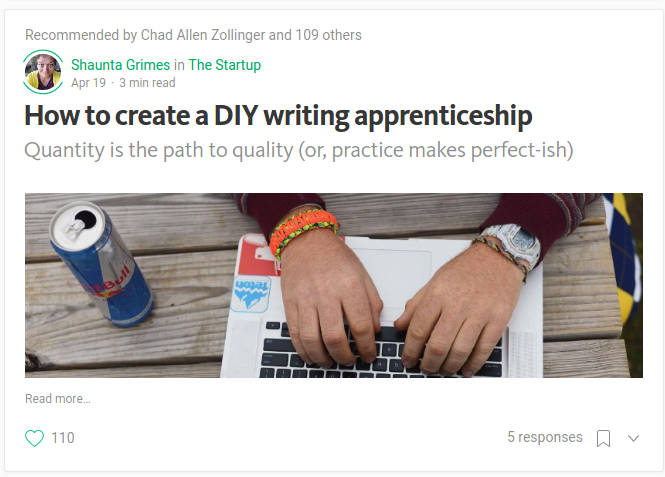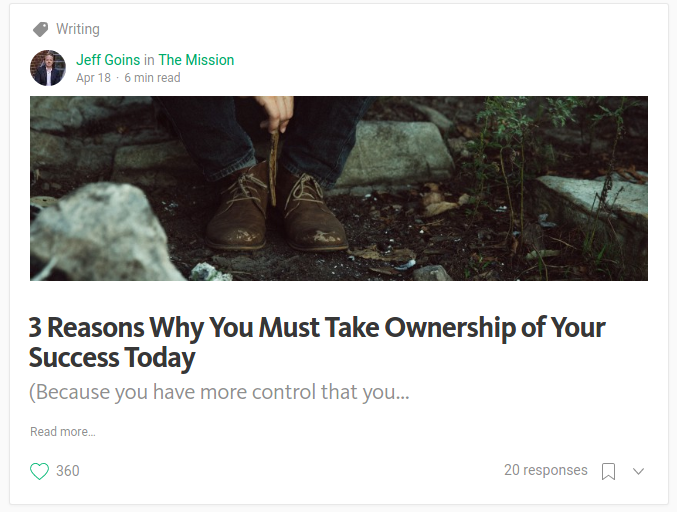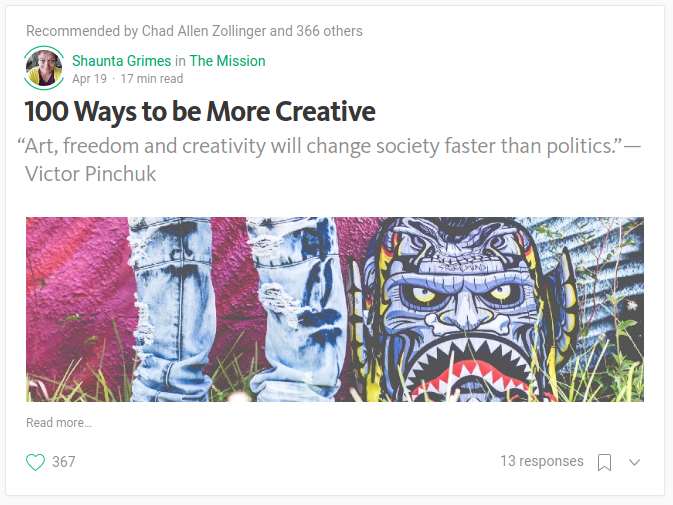Day 64 - My thoughts on a Quora answer I disliked, why are titles on Medium so clickbait-y?
22 Apr 2017 Tweet 100daysofwriting · answers · clickbait · dislike · medium · quora · writingYesterday, a friend shared [this Quora answer]https://www.quora.com/What-are-some-psychological-facts-that-people-dont-know-1/answer/Dorottya-T%C3%B3th) which ended up with it appearing on my news feed.
I read the answer and instantly disliked the contentions made by the author. I was going to let it go, until someone asked me to ellaborate on why I disliked the answer. I had to think about this for just a bit, after which I came up with this extremely long answer:
Ah, thanks for making me think more about it! :D
First of all, if writing was Tom’s true dream, he ought to have done something concrete towards it. But let’s not talk about that, because he probably has a lot of reasons why he can’t do it.
Why Sam doesn’t exist:
If writing is your dream and you have a day-job, you can find maybe 1 hour of worthwhile free time that you might spend doing something else. Say Tom doesn’t tell anyone about his writing habits, and just does it alone (apparently Tom can achieve anything then), does he write enough?
When you start anything big, the excitement is very high, you might put in upto 6-7 hours of writing the first day, but you will always get to a point where that initial excitement is gone and this is the pivotal point for any project. You must either struggle through it and stick with your project or ditch it. This is when you struggle for motivation, struggle to find content, struggle to decide whether you should keep at it or just drop it.
If you made a public proclamation, your friends will keep asking about it, the closest ones for sure. It’s embarassing to accept that you didn’t go through with something that you were so passionate about, because accepting that you stopped to someone else is simply an indirect way of admitting it to yourself. You really wanted to do something, and you couldn’t go through with it. What does that say about you? How did your perception of yourself change? Negatively, I argue.
Someone who doesn’t tell any of his friends anything and just publishes a book doesn’t exist. That just doesn’t happen. Everyone slowly moves towards their goal, they don’t just GET there.
Why this is a generalisation:
Everyone is different, following your dreams and passions is a topic that’s been heavily written about offline and online. People have always wanted that single formula to get there, to become a writer or a film-maker or whatever. The fact that it’s been so long, and there’s no formula yet is enough to prove that no such formula exists.
No such formula exists because EVERY SINGLE SITUATION IS DIFFERENT. That’s the core reason for my dislike of this answer. This is an overly simplified answer about a very complicated, specific problem: How do you get to where you want to be, from where you are? There’s no one single way to do that, and consequently, there’s no single way you can completely screw it up either. Every step in any direction is a step towards the goal or away from it, but making progress is more important than making sure that each step you take goes towards the goal. (Some of Casey Neistat’s videos have really detailed explanations of goals and life and the path to take to get there. All of the above has formed from my own experiences with ambitious projects and accomplished people’s views on the topic)
Nit picks:
The question asks for psychological facts, facts are generally supported by research that is either biological or done using control groups and analysis. They are not things that you can come up with using fictional characters and thought experiments.
The comments of that answer have some references to a 2009 paper. That paper is shaky, IMHO. If you believe that the experiment that was performed was to the point and is an accurate representation, good for you. :)
Relatability:
There’s no getting around the fact that more than 10,000 people thought that answer was a good one. Maybe the answer is relatable, that doesn’t make the answer true. Just because something happened to 10,000 people doesn’t mean that’s the only way to do that thing. There are other ways too. :)
I have definitely written down everything that I didn’t like about the answer. One of the responses to this comment was very interesting:
I agree to your point that it’s an “overly simplified answer” - something most writers on Quora/Medium tend to do to bring the focus on to one focal point, often off reality. For example, I completely agree that the ideal Sam as described doesn’t exist. It’s sometimes got to be taken with a pinch of salt.
(emphasis mine)
The bringing the focus onto one point is a major reason for my moving off of these two platforms. Medium especially faces this problem a lot. Most of the articles on Medium are preachy, clickbaity or give you a list to do something. Frankly, it’s rather irritating.
While Quora is something that has content which can be enjoyed as entertainment, one must never make the mistake of taking Quora answers and associating them to words that are even near as strong as “facts”. Most things on Quora are experience based, and only those questions are worth reading. That said, there is something off about these two platforms. Maybe it’s the lack of curation and the algorithmic suggestion of articles based on our past reads, which in most cases are just one-time reads to understand a topic.
If I saw a Medium article about “Why people should write”, that doesn’t mean you fill my newsfeed with “How to become a great writer in 6 months” articles for the next 10 years. That doesn’t make any sense. These platforms perhaps work best when you use them as your primary source for user created content. If you consume content across the Internet, you are probably going to have a bad experience with them.
To prove my point, I will show the first few posts on my Medium feed:
 **
**
 **
**
 **
**
 **
**
 ***
***
Now, I am aware that I am judging an article by it’s title and thumbnail and that some of these articles might be really good. But the fact that all those titles irritate me and I would never click on something like that is enough to understand that I would never get to know whether those articles were good or not. Can we tone it down, please?
I would like less Clickbait-y, more news-like titles which don’t give me a list, or tell me what I must do, but a title that tells me what the content of the article is.
Now that you have reached here, take all of that with a table spoon of salt because I don’t spend any time on Medium and I don’t know anything about how the articles with irritating titles are underneath the hood.
POST #64 is OVER